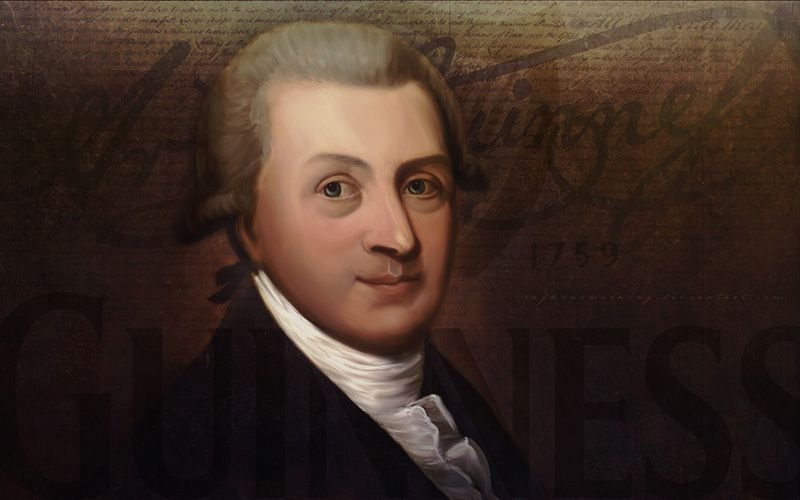Arthur Guinness
(1725-1803) Arthur Guinness GDB/GU08/0050 Arthur Guinness was born in 1725 near Celbridge,
county Kildare where his father, Richard Guinness, was Land Steward to Dr. Arthur Price, Archbishop
of Cashel. Part of Richard's duties was to supervise the brewing of beer for the workers on the estate
and it is probable that young Arthur first learnt the art of brewing from his father. The Archbishop,
Arthur's godfather, left Arthur £100 in his will and with this money Arthur was able to run a small
brewery in nearby Leixlip. In 1759, aged 34, he left the Leixlip brewery to his younger brother and
set out to try his luck in the capital city of Dublin. The brewing industry in Dublin at that date was
suffering because English beer was taxed less severely than the home-produced product. Arthur was
not, however, deterred. He decided to acquire what was then a small, disused and ill-equipped
brewery at St James's Gate. The lease, signed on 31 December 1759, was for 9000 years at an annual
rent of £45. The premises at the time comprised of four acres with a copper, a kieve, a mill, two
malthouses, stabling for twelve horses and a loft to hold 200 tons of hay. On 1 December Arthur had
entered his signature, as a new brewer, in the Minute Book of the Dublin Brewers and Maltsters
Corporation. Within eight years he had risen to become Master of the Corporation. To start with
Arthur brewed ale, but by the 1770s a new drink, a strong black beer called porter, was being
exported from London to find favour in Dublin. Arthur decided to brew this new beer himself. He
proved extremely successful and Guinness's porter was well known in London by 1794 as a magazine
illustration of that date shows a man drinking porter with a barrel labelled ‘GUINNESS’ beside him. In
1799 Arthur made the momentous decision to stop brewing ales and concentrate solely on porter -
history has shown he made the right choice. Arthur Guinness was a determined man, particularly in
defence of his rights. The brewery lease granted him free access to a water supply. In 1775 the
Dublin Corporation tried to make him pay for this access by sending the sheriff with a body of men
to cut off his water source. Arthur responded vigorously by seizing a pick-axe from one of the men
and declaring "with very much improper language that they should not proceed". He won his point
and the brewery maintained its vital free water supply. Right into his seventies Arthur continued to
be active in supervising his business at the Brewery, now assisted by three of his sons. Arthur had
married an heiress, Olivia Whitmore, and had 21 children, 10 of whom survived into adulthood.
Besides his house in Dublin, Arthur purchased a country house at Beaumont, near Dublin, and was
active in public life, becoming Governor of the Meath Hospital and Secretary to the Friendly Brothers
of St Patrick. He donated 250 guineas to the Chapel Schools attached to St Patrick's Cathedral. He
was also brewer to Dublin Castle, the seat of government in Ireland. When he died in 1803, left a
considerable personal fortune of about £23,000 and an extremely flourishing business which later
generations of his family were to develop, following the example of initiative and enterprise set by
its founder.
